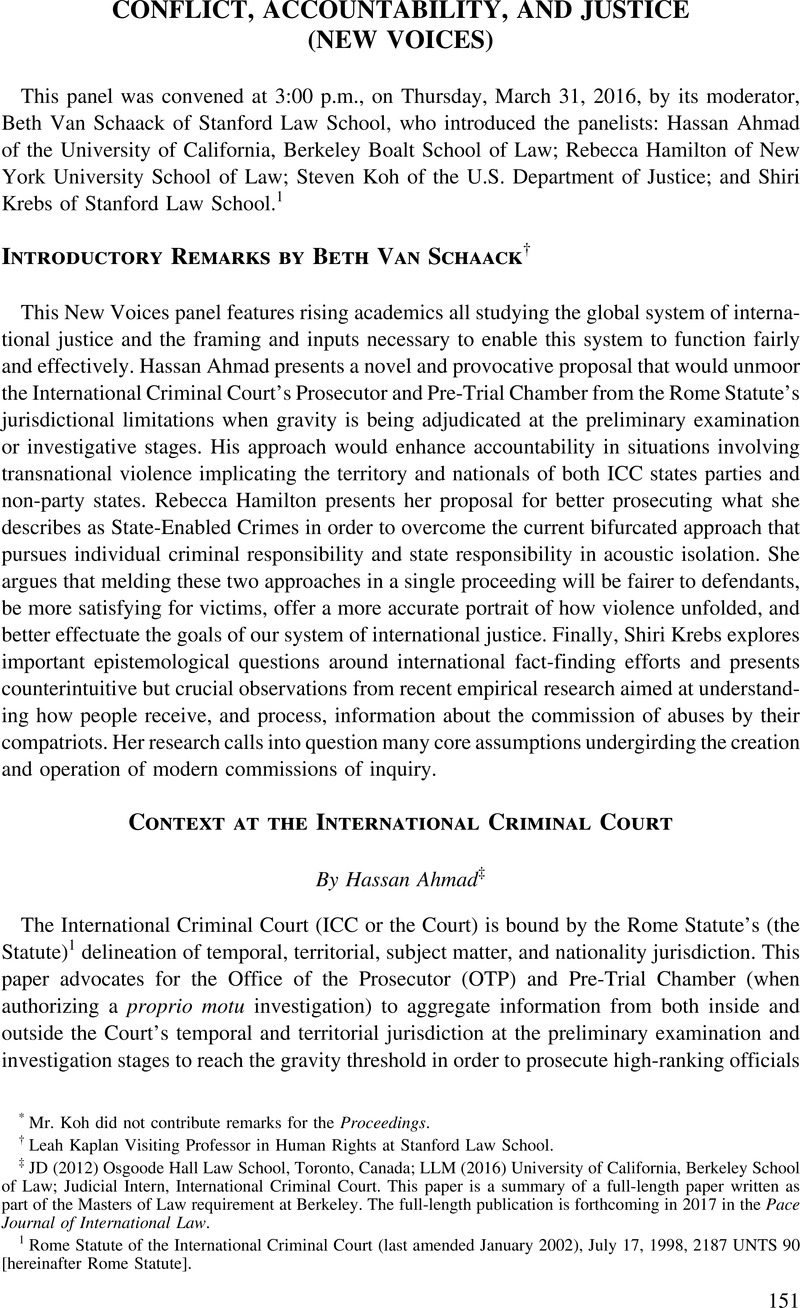No CrossRef data available.
Published online by Cambridge University Press: 18 May 2017

2 See, e.g., Amnesty International, Annual Report 2015/16: The State of the World's Human Rights 194–98 (2016); The Persistence of History, Economist (Aug. 22, 2015); Human Rights Watch, Iraq Report, at https://www.hrw.org/middle-east/n-africa/iraq.
3 Paris Attacks: What Happened on the Night, BBC News (Dec. 9, 2015), at http://www.bbc.com/news/world-europe-34818994.
4 Lizzie Deardon, ISIS Supporters Claim Group Responsible for Brussels Attacks: ‘We Have Come to You with Slaughter,’ Independent (Mar. 22, 2016), at http://www.independent.co.uk/news/world/europe/isis-supporters-claim-responsibility-for-brussels-attacks-bombings-belgium-airport-maalbeek-metro-we-a6945886.html.
5 Office of the Prosecutor, Statement of the Prosecutor of the International Criminal Court, Fatou Bensouda, on the Alleged Crimes Committed by ISIS (Apr. 8, 2015).
6 Situation on Registered Vessels of the Union of the Comoros, The Hellenic Republic of Greece and the Kingdom of Cambodia, ICC-01/13, Application for Review Pursuant to Article 53(3)(a) of the Prosecutor's Decision of 6 November 2014 Not to Initiate an Investigation in the Situation, para. 15 (Jan. 29, 2015) [hereinafter Comoros Application] (“[t]he wider occupation/conflict and the blockade are pre-conditions to the exercise of the Court's subject matter jurisdiction and the necessary contextual requirements for the conduct on board the vessels (over which the Court has territorial and temporal jurisdiction) to be charged as war crimes at the ICC… . Acts occurring outside of the territorial and temporal jurisdiction of the Court can certainly be taken into account when considering whether the Court can exercise jurisdiction over conduct which is within its territorial and temporal jurisdiction and in order better to understand and to characterise such conduct.”).
7 The Pre-Trial Chamber granted the request and asked the Prosecutor to reconsider her decision to not investigate on the grounds that the decision to investigate occupies the lowest evidentiary threshold of a “reasonable basis to proceed.” See Comoros Application, id., para. 14.
8 Rome Statute, supra note 1, Art. 11(1). For parties signing on after July 1, 2002, the Statute enters into force from the date of ratification.
9 Id. Art. 12(2)(a).
10 Id. Art. 13(b).
11 Id. Art. 17.
12 Situation in the Libyan Arab Jamahiriya, ICC-01/11-12, 27, Decision on the Prosecutor's Application Pursuant to Article 58 as to Muammar Mohammed Abu Minyar Gaddafi, Saif Al-Islam Gaddafi and Abdullah Al-Senussi, para. 26 (June 27, 2011).
13 Nahimana v. Prosecutor, Case No. ICTR-99-52-A, Appeals Judgment, para. 315 (Nov. 28, 2007).
14 deGuzman, Margaret M., Gravity Rhetoric: The Good, the Bad, and the ‘Political,’ 107 ASIL Proc. 421, 421–22 (2013)Google Scholar. See also deGuzman, Margaret M., The International Criminal Court's Gravity Jurisprudence at Ten, 12 Wash. U. Global Stud. L. Rev 475 (2013)Google Scholar; deGuzman, Margaret M., How Serious are International Crimes? The Gravity Problem in International Criminal Law, 51 Colum J. Transnat’l L. 18 (2012)Google Scholar; deGuzman, Margaret M., Choosing to Prosecute: Expressive Selection at the International Criminal Court, 33 Mich. J. Int'l L. 265 (2012)Google Scholar; deGuzman, Margaret M., Gravity and the Legitimacy of the International Criminal Court, 32 Fordham Int'l L.J. 1400 (2009)Google Scholar.
15 International Criminal Court, Office of the Prosecutor, Policy Paper on Preliminary Examinations, paras. 61–65 (Oct. 4, 2010).